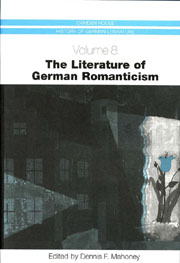Book contents
- Frontmatter
- Contents
- Illustrations
- Acknowledgments
- Abbreviations
- Introduction
- From “Romantick” To “Romantic”: The Genesis of German Romanticism in Late Eighteenth-Century Europe
- Goethe and the Romantic
- Early Romanticism
- From Goethe's Wilhelm Meister to anti-Meister Novels: The Romantic Novel between Tieck's William Lovell and Hoffmann's Kater Murr
- Tales of Wonder and Terror: Short Prose of the German Romantics
- The Romantic Drama: Tieck, Brentano, Arnim, Fouqué, and Eichendorff
- German Romantic Poetry in Theory and Practice: The Schlegel Brothers, Schelling, Tieck, Novalis, Eichendorff, Brentano, and Heine
- The Turn to History and the Volk: Brentano, Arnim, and the Grimm Brothers
- History and Moral Imperatives: The Contradictions of Political Romanticism
- Romanticism and Natural Science
- Gender Studies and Romanticism
- The Romantic Preoccupation with Musical Meaning
- Romanticism and the Visual Arts
- Goethe's Late Verse
- The Reception of German Romanticism in the Twentieth Century
- Works Cited
- Notes on the Contributors
- Index
The Turn to History and the Volk: Brentano, Arnim, and the Grimm Brothers
Published online by Cambridge University Press: 05 February 2013
- Frontmatter
- Contents
- Illustrations
- Acknowledgments
- Abbreviations
- Introduction
- From “Romantick” To “Romantic”: The Genesis of German Romanticism in Late Eighteenth-Century Europe
- Goethe and the Romantic
- Early Romanticism
- From Goethe's Wilhelm Meister to anti-Meister Novels: The Romantic Novel between Tieck's William Lovell and Hoffmann's Kater Murr
- Tales of Wonder and Terror: Short Prose of the German Romantics
- The Romantic Drama: Tieck, Brentano, Arnim, Fouqué, and Eichendorff
- German Romantic Poetry in Theory and Practice: The Schlegel Brothers, Schelling, Tieck, Novalis, Eichendorff, Brentano, and Heine
- The Turn to History and the Volk: Brentano, Arnim, and the Grimm Brothers
- History and Moral Imperatives: The Contradictions of Political Romanticism
- Romanticism and Natural Science
- Gender Studies and Romanticism
- The Romantic Preoccupation with Musical Meaning
- Romanticism and the Visual Arts
- Goethe's Late Verse
- The Reception of German Romanticism in the Twentieth Century
- Works Cited
- Notes on the Contributors
- Index
Summary
Folk Songs and Fairy Tales: Examples of Folk Literature
One salient feature of German Romanticism is the importance of “Volksdichtung” or “Volksliteratur” (folk literature). By this term the Romantics understood literature that has its origins in the collective memory of the people or even of one specific nation. “Volksliteratur” is part of a national or international cultural tradition, though it can be collected or even written down in a specific historical version by one single author.
Johann Gottfried Herder (1744–1803) is a key figure in the process of propagating and diffusing the concept of Volksliteratur in Germany. In the 1760s, his function was restricted to a process of cultural transfer. Among German poets and intellectuals, Herder was the first to give an enthusiastic reception to James Macpherson's (1736–96) Fragments of Ancient Poetry (1760), which were said to have been created by the blind Gaelic bard Ossian. Later on, Herder was also the first to undertake an individual collection of folk songs in German. The Volkslieder (Folk Songs, 1778–79) are based on a multi-national idea of folk literature. It is characteristic of his understanding of folk literature that Herder includes not only Nordic and Native American folk songs but also poems by Shakespeare and songs by Goethe. Some of the texts are written by contemporary authors, others are derived from the oral traditions of highly heterogeneous ethnic groups. Herder justifies such diversity by emphasizing their common origins in a living and vivid culture.
- Type
- Chapter
- Information
- The Literature of German Romanticism , pp. 171 - 190Publisher: Boydell & BrewerPrint publication year: 2003



